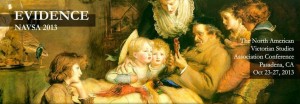The North American Victorian Studies Association Conference for 2013, in Pasadena, California, October 23rd-27th, invites papers on the theme of evidence. Evidence is central to all our work: we use texts, images, objects, the built environment to support our arguments. We also interpret, select, arrange, and juxtapose such evidentiary material. The Victorians strenuously looked for evidence to support their assumptions, beliefs, and investigation. Our program will include optional workshops at the Getty Research Institute and material culture sessions at the Huntington. Conference attendees will be able to enter the Huntington and its wonderful gardens free of charge.
Proposals for individual papers or panels should be submitted electronically by March 1, 2013. Proposals for individual papers should be no more than 500 words; panel proposals should include 500-word abstracts for each paper and a 250-word panel description. Applicants should submit a one-page cv.
Conference threads might include:
- What is evidence? How do different disciplines identify and use evidence? How does the use of evidence draw boundaries and bridges between disciplines? How does interdisciplinary work deal with evidence?
- How has the use of evidence changed (new evidence and new ways to use old evidence)?
- Evidence and the humanities: interpretation, analysis, scientific and historical method, supporting arguments
- Digitization and the changing nature of the archive, museum and library
- Teaching and evidence: sources, assessment, pedagogies
- Lost evidence: wars and other research inconveniences
- Imagined evidence and historical fictions
- Science: method, demonstration, essentialism/Social Darwinism
- Religion: belief, faith and intuition
- Personal evidence: autobiographies, letters and diaries
- Visual evidence: photography, painting, theater, film and other displays
- The building, the city and the village: architecture, urban planning and historic preservation
- Archaelogy, fossils, bone, tracks, spoor
- The body as evidence
- Material culture: clothes, pottery, and other everyday objects
- Crime and Justice: police, detectives, witnesses and the press
- Politics: parliamentary inquiries, select committees
- Ghosts and revenants: evidence of the supernatural and of the afterlife
- The press: scandal and public opinion
- Evidence and the colonial project
